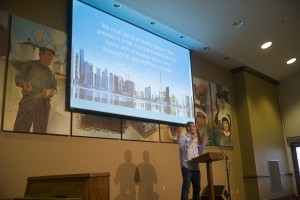by IMB staff
 RICHMOND, Va.—International Mission Board leaders have outlined a plan to address IMB’s revenue shortfalls and complete a reset of the organization in order to move forward into thefuture with innovative vision, wise stewardship and high accountability.
RICHMOND, Va.—International Mission Board leaders have outlined a plan to address IMB’s revenue shortfalls and complete a reset of the organization in order to move forward into thefuture with innovative vision, wise stewardship and high accountability.
The plan was presented by senior IMB leadership, including President David Platt, during an Aug. 27 town hall meeting including missionaries and staff, who collectively attended either in person or through digital communication. IMB trustees were informed of the plan during their Aug. 25-26 board meeting in downtown Richmond, Virginia.
Platt said the urgency of the plan is based in the reality that while Southern Baptist giving through the Cooperative Program and the Lottie Moon Christmas Offering has increased in recent years, the IMB projects it will fall $21 million short of its current annual budget, marking several consecutive years of budget shortfalls for the 170-year-old organization. Over the past six years, the organization’s expenditures have totaled $210 million more than has been given to it each year.
To address revenue shortfalls over these years, IMB enacted a plan to slowly reduce the number of missionaries through normal attrition and limited appointments, while using IMB’s reserves — including global property sales — to keep as many missionaries on the field as possible.
“We praise God for the reserves and property sales that made this possible and for leadership which chose to spend these resources for the spread of the gospel,” Platt said. “But we cannot continue to overspend. For the sake of short-term financial responsibility and long-term organizational stability we must act.”
OVERCOMING REVENUE SHORTFALL
Sebastian Traeger, IMB’s executive vice president, explained that senior leadership considered several options to overcome the revenue shortfall.
“The challenge is that we’re looking at both large revenue shortfalls and low cash reserves — so any action needs to include a plan to address both simultaneously,” Traeger said. “We considered multiple options — such as further reducing missionary appointments or liquidating additional property — but none of them bring about a balanced budget fast enough, or they are not feasible to implement in the short term. Our goal is to align our cost structure with the amount of money given to us each year.”
Leadership determined the only option that is both feasible and has significant financial impact is to reduce the number of personnel it supports, since the vast majority of the IMB expenses are personnel related.
“If we are going to balance our budget, we must reduce approximately 600 to 800 of our staff and field personnel,” Platt said, indicating that number represents up to 15 percent of IMB’s total employees.
IMB leadership has decided the best way to reduce staff is to begin with a voluntary retirement incentive that will be offered to all eligible employees, including both missionaries and staff. While the parameters defining who is eligible are still being finalized, details of the incentive will be announced Sept. 10, 2015, and those eligible will be notified in the days following the announcement.
“Whether to accept the incentive is a voluntary decision completely up to the discretion of eligible individuals,” Platt said. “This offers personnel who may already be considering a transition in their lives an opportunity to make that transition.
“We want to be as generous as possible, and we want to honor every brother or sister for his or her service. We know that taking a voluntary retirement incentive does not mean stepping onto the sidelines of mission, but moving into a new phase of involvement in mission.”
IMB is sending approximately 300 new missionaries in 2015 and expects to send a comparable number in 2016.
As phase one of the plan (the voluntary retirement incentive) is being implemented, phase two of the plan will focus on concluding a reset of the organization. Platt said that phase would include consolidating support services, recalibrating mobilization, assessing global engagement and re-envisioning training.
He noted the organization must humbly and openly ask God, “What are you leading us to do?” and individual employees must ask God, “What are you leading me to do?”
“We must get to a healthy place in the present in order to be in a healthy position for the future,”Platt said. “We want to move forward with innovative vision, wise stewardship, and high accountability to the churches we serve, the peoples we reach, and the God we worship.”







